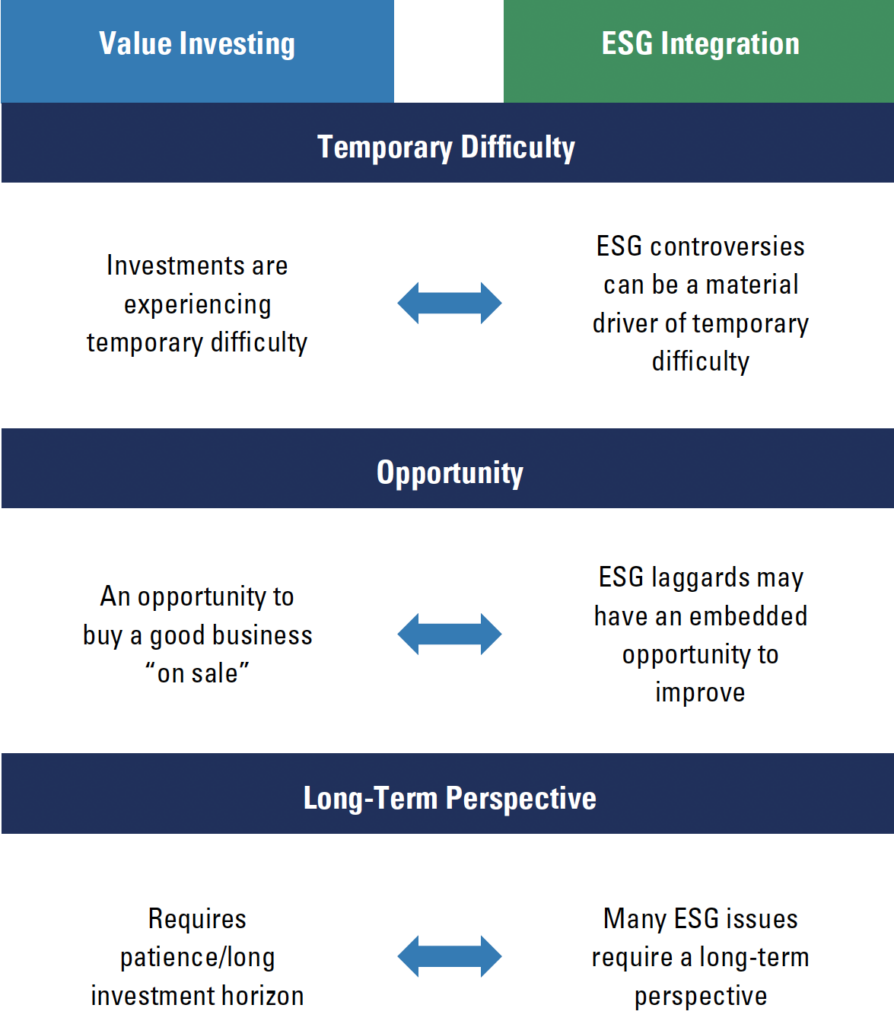ESG as a Key Component of Bottom-up Fundamental Analysis
Q1 2023
ESG is a key component of bottom-up fundamental analysis. Engagement and improvement can drive value creation and lead to successful investment outcomes.
Environmental, Social and Governance (ESG) rose to prominence in the asset management industry relatively unquestioned. Recently, opinions on the topic have become increasingly polarized. We do not subscribe to either extreme: that investors should pursue special interest group agendas no matter
the cost to companies, or that considering ESG is damaging to investment outcomes. Against the backdrop of the ESG debate, we thought it would be helpful to get back to the foundations of ESG and why we continue to pursue ESG integration.
Fundamentally, this comes down to the philosophical alignment between the principles of a value investor and ESG integration. ESG integration simply means considering a sub-set of issues that can become financially material and, in such cases, become relevant to investment outcomes. As such, our investment research would be incomplete without appropriate consideration of material ESG issues. ESG integration at Pzena is about fully understanding the value opportunity at stake for a given company and, through active ownership, engaging to create long-term value.
Below are some of our core philosophical beliefs as a value investor, and we highlight the inherent compatibility with ESG integration.

1. Temporary Difficulty: Undervalued stocks typically experience some kind of difficulty; hence they trade at a discount to the rest of the market. The possible reasons for a depressed valuation are numerous, including that the company faces ESG issues or has mismanaged its exposure to ESG risk. Fundamental bottom-up research enables us to make informed judgements about whether a company’s difficulty (ESG or otherwise) is temporary or permanent, and whether we can envision a path to earnings recovery.
2. Improvement Opportunity: Once the source of difficulty has been identified, value investors must assess the embedded opportunity. Value investing offers an opportunity to buy a good business “on sale”. Usually, the opportunity exists because the business is undergoing a temporary setback, such as declining earnings. For those companies that are also ESG laggards, part of the investment opportunity can be the potential for future improvement in material ESG dimensions, which can benefit business constituents, including shareholders. In this sense, we do not believe in inherently “bad” or “good” ESG companies. What matters is the embedded opportunity to improve.
3. Long-Term Perspective: Value investors must often exercise patience, as earnings recovery may take place slowly over time. This patient approach is naturally aligned with the time horizon over which ESG issues may play out. Consider, for example, the issues that climate change poses to many industries that need
to undergo costly transitions to pivot legacy business models toward activities that facilitate energy transition.
4. Alpha Potential: Earnings recovery is important for value investors because it can be a key source of alpha potential. We look to improvement in business fundamentals as a source of excess return. Assuming ESG issues are financially material, it makes sense that ESG improvement could be a material driver of this recovery. We examined the relationship between ESG scores and investment performance and found that companies with improved ESG scores tend to outperform stocks with lower improvement in their ESG scores.
SUMMARY
At Pzena, ESG analysis will remain a key component of bottom-up fundamental company analysis. Our research is centered on how ESG issues directly or indirectly affect company financials and/or the range of outcomes for a given investment. We use our influence through engaged, active ownership to encourage improvement in material ESG issues and create value. This is, after all, simply good investing.